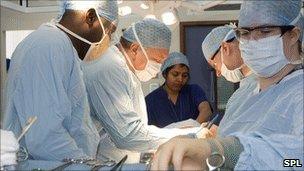Kidney transplant policy change 'could save hundreds'
- Published

Patients are now often offered a kidney from a donor whose heart has stopped
The number of UK kidney transplants could be doubled and hundreds of lives saved by using more organs from those whose hearts have stopped, experts say.
Traditionally kidneys from those who are brain dead but whose hearts are still working have been preferred.
A Cambridge University study of 9,000 transplants found kidneys from "cardiac death" donors - used on a local basis but not nationally - are as good.
In the Lancet, experts said the results were "persuasive" about the benefits.
It is estimated about 700 people die each year waiting for a kidney.
At present, there are 7,000 people waiting for a transplant, but only about 2,500 are performed each year.
Kidneys from those whose brains have stopped functioning but whose hearts continue to beat on life-support are prioritised for transplant as these organs have not been deprived of a blood supply.
Increasing numbers
However this pool of donors has reduced in recent years as a result of improvements in the treatment of people with head injuries and a fall in the number of deaths on the road. As a result, more kidneys have been taken from cardiac death donors.
For the most part these are people who have suffered irreversible brain damage but do not fulfil the criteria for brain-stem death. The organs are taken shortly after life support is turned off and their heart has stopped beating.
But these have long been seen as a second-best option due to concerns that injury is caused to the organs when the blood flow stops, as up to 20 minutes elapses between the heart stopping and the organ being removed.
These kidneys are used on a local basis, but reservations about their quality mean they do not enter the UK's national allocation system, in which available organs are fairly distributed according to need and chance of survival.
This should no longer be the case, suggests the team from Addenbrooke's Hospital and Cambridge University, which analysed survival rates from more than 9,000 transplants.
Nearly 850 were from cardiac death donors.
Recipients of these organs showed no difference in survival for up to five years or in kidney function when compared with those who had received organs from brain dead donors.
"The shortage of donor organs remains one of the key challenges faced by the international transplant community. In view of our findings, cardiac death donors represent an extremely important and overlooked source of high-quality donor kidneys for transplantation," the authors write in the Lancet.
The potential was there, they added "to increase markedly the number of kidney transplants performed in the UK".
The suggestion that kidney transplants could be doubled if this practice were to become more widely available could turn out to be a conservative estimate, Dr Dominic Summers, one of the authors, told the ģÉČËŋėĘÖ.
Long wait
The Kidney Advisory Group of the organisation that oversees UK transplantation is currently considering whether to allow cardiac death donations to enter the national allocation scheme. This paper is thought likely to influence their decision.
In an accompanying comment in the Lancet, Professor Sir Peter Morris, of the Royal College of Surgeons of England, says: "Today's report is an important contribution to the problem of increasing the supply of donor kidneys for transplantation.
"The results are persuasive that the use of controlled cardiac-death donors is an acceptable practice. More importantly, potential recipients of kidneys from cardiac-death donors can be reassured that their transplant outcome is not jeopardised by the source of the kidney."
Dr Rob Higgins of the National Kidney Federation said: "Most units in the UK have offered patients a choice as to whether to receive a kidney from a [cardiac death] donor or not; some patients have chosen not to have this option on the basis of previously reported outcomes.
"This new information should prompt them to reconsider that choice."